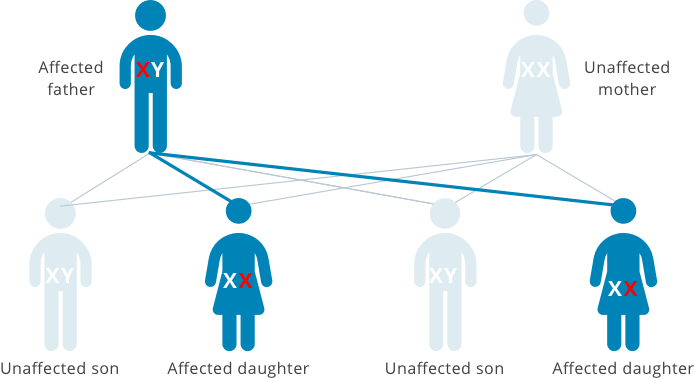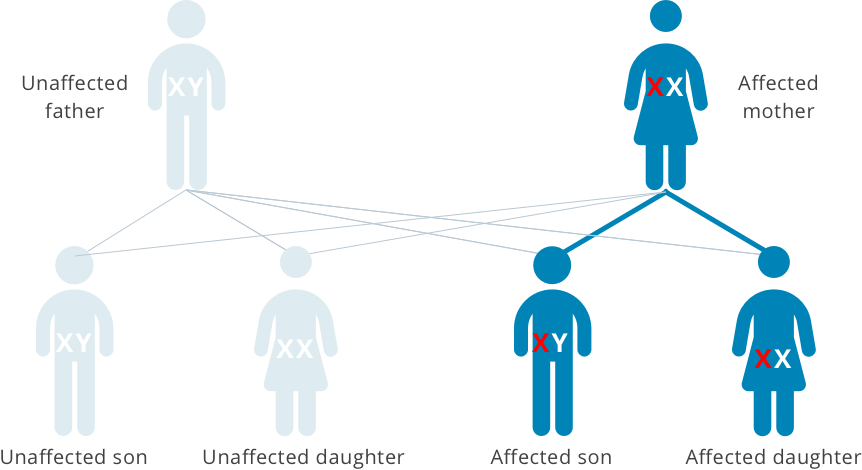Each of us has information, called DNA, coded in our cells. We inherit this DNA from our parents. Males inherit one X and one Y chromosome, while females inherit two X chromosomes. Because the GLA variant is found on the X chromosome, Fabry disease can be passed down by either parent.

A father with Fabry disease passes along his variant to all of his daughters. This is because daughters get their father’s only X chromosome with the mutated GLA variant. A father with Fabry disease never passes the GLA variant to his sons, because sons get a Y chromosome from their fathers.

A mother who has the GLA variant on one of her two X chromosomes has a 50% chance of passing down Fabry disease to each of her children (male or female). Because males only have one X chromosome, if they inherit the variant, they will all develop Fabry disease. In affected females, the GLA gene may work normally in some parts of the body but not others. This is believed to be one reason why females have more variable symptoms than males.
In rare cases, Fabry disease may not be inherited. Mutations may spontaneously occur and be unique to the individual. These are known as de novo mutations. However, these individuals may still be able to pass the disease on to their children.
Determine who in your family may be at risk for Fabry disease.
Build my family tree“In the early stages of being diagnosed with the disease, doctors acted like I didn’t have any symptoms because I was a woman. Talk about frustrating! Contrary to popular belief, women and girls can have severe Fabry symptoms. I am one of them.”
Debunk past myths with current facts.
Fabry in womenFabry can present in many different ways, from mild symptoms to more severe.
*Required fields
Sign up to get more information about Galafold and Fabry disease.
Before taking Galafold® (migalastat), tell your healthcare provider about all of your medical conditions, including if you:
Tell your healthcare provider about all the medicines you take, including prescription and over-the-counter medicines, vitamins, and herbal supplements. Especially tell your healthcare provider if you take medicines or supplements containing caffeine as these medicines or supplements may affect how Galafold works.
How should I take Galafold?
Do not eat food, or take or drink any product that contains caffeine at least 2 hours before and 2 hours after taking Galafold to give a minimum 4 hour fast.
What are the possible side effects of Galafold?
The most common side effects of Galafold include headache, stuffy or runny nose and sore throat, urinary tract infection, nausea, and fever.
These are not all the possible side effects of Galafold. Call your healthcare provider for medical advice about side effects.
What is Galafold?
Galafold is a prescription medicine used to treat adults with Fabry disease who have a certain genetic change (variant) in the galactosidase alpha gene (GLA) that is responsive (amenable) to Galafold.
It is not known if Galafold is safe and effective in children.
You may report side effects to FDA at 1-800-FDA-1088. You may also report side effects to Amicus Therapeutics at 1-877-4AMICUS.
Please click here for Full Prescribing Information, including Patient Information and Instructions for Use.
